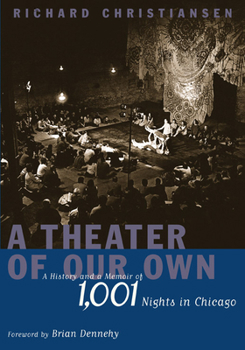A Theater of Our Own: A History and a Memoir of 1,001 Nights in Chicago
Select Format
Select Condition 
Book Overview
Winner of the Illinois State Historical Society Book Award for Superior Achievement A Theater of Our Own is a fascinating, fast-paced, and fact-filled chronicle of Chicago's legendary theater scene by the long-time chief critic for the Chicago Tribune. Who produced the first stage adaptation of "The Wizard of Oz" in 1902-nearly forty years before the movie classic? What entertainment juggernaut began in a converted Chinese...
Format:Hardcover
Language:English
ISBN:0810120410
ISBN13:9780810120419
Release Date:November 2004
Publisher:Northwestern University Press
Length:300 Pages
Weight:2.01 lbs.
Dimensions:1.1" x 7.3" x 10.1"
Customer Reviews
3 ratings
The history and the memoir are equally strong
Published by Thriftbooks.com User , 18 years ago
Richard Christiansen modestly downplays his role in creating today's amazingly vibrant Chicago theater scene with groundbreaking reviews in the Daily News and Tribune, but that's the only "weakness" in this spectacular history. His research into the earliest days of Chicago theater --150 years ago -- are as vividly realized as those of which he has first-hand knowledge. This volume is a vital resource for understanding the "Chicago school" whose effects have come to touch Broadway, TV, and motion pictures in equal parts.
A story that needed to be told by the best guy to tell it
Published by Thriftbooks.com User , 19 years ago
As just about anybody in the Chicago theatre movement will cheerfully tell you, a substantial percentage of the reason Chicago has built a reputation as America's great homegrown theatre city is that former CHICAGO TRIBUNE critic Richard Christiansen had the energy to go to an awful lot of storefronts, basements, churches, galleries and other miscellaneous spaces to find the likes of David Mamet, Robert Falls, Mary Zimmerman, Frank Galati, Laurie Metcalfe, Joan Allen, Amy Morton, John Malkovich and so many of the others who have gone on to make their marks in the theatre. Christiansen puts all this into a coherent narrative and, incidentally and implicitly, suggests what the conditions for such a flowering must be in other cities. The one thing he (typically modestly) doesn't put as being a necessary ingredient is himself. Critics with his idealism, enthusiasm and decency are hard to come by. Without compromising his pursuit of excellence, he still was able to encourage even when he wrote unfavorable reviews. He also resisted the critics' disease -- to make a quip that draws attention to the critic at the expense of the subject. One of these days, maybe someone will write a companion volume that gives Mr. C. his due, but for the moment this book is splendid and necessary. Anybody trying to make theatre should read it and learn the lessons it contains.
A Comprehensive Theater History.
Published by Thriftbooks.com User , 19 years ago
Written by a movie review expert who spent twenty-five years at the 'Chicago Tribune' as chief critic and arts and entertainment editor until he retired in 2002, he gives the background of early theaters and their demise. The best feature of this study of drama and theater from the early 1830s is the abundance of old photos and playbills interspersed throughout. Innumerable theaters existed in such a large place as Chicago. McVicker's in the 1850s was considered the 'high class' theater of Chicago, a place for the major stars and shows of its time. Sarah Bernhardt made her Chicago debut there in 1881, which she called the 'pulse of America.' Edwin Booth, son-in-law of James McVickers, mgr., and his brother, John Wilkes Booth appeared there in RICHARD III. Edwin shared acting honors in OTHELLO and JULIUS CAESAR with James O'Neill whose son Eugene wrote about in his drama, 'Long Day's Journey into Night.' McVickers himself appeared as the grave digger in HAMLET. It was destroyed by fire in 1871, again in 1890, to be replaced in 1922 as a movie theater which was razed in 1984 as were so many others across the country. In 1906, the Majestic (later called Shubert) opened on Monroe St. at Main near the Loop. It's still there in the theater district with five others. In 1959, the Shubert hosted 'The Music Man' starring Forrest Tucker. Shubert has continued in business through the decades, except the Depression years (1932-45). In the 1990s, Mayor Daley decided to revive some of the old money-generating bustle and prestige-garnering glamour of the theater scene downtown. The Shubert is now owned by New York based firms, and will be revamped in 2005, and, after all these years, will sport a new name -- LaSalle Bank Theatre. An early move toward revival of the Loop area took place in the 1980s. Chicago Theatre (1921) on State Street was threatened with demolition but, after nine months and $25 million investment, it was restored. So were the Palace on Randolph St., and the Oriental (both 1926) all refurbished, back to the French Renaissance splendor as movie palaces. The old Shubert, I feel, is Chicago's theater above par. I was offered a chance to go inside some of them back in the '90s but didn't have any historical aspect in my life at that same, so let the opportunity pass by. It's wonderful how Chicago was able to do what New York could not with movie theaters.






